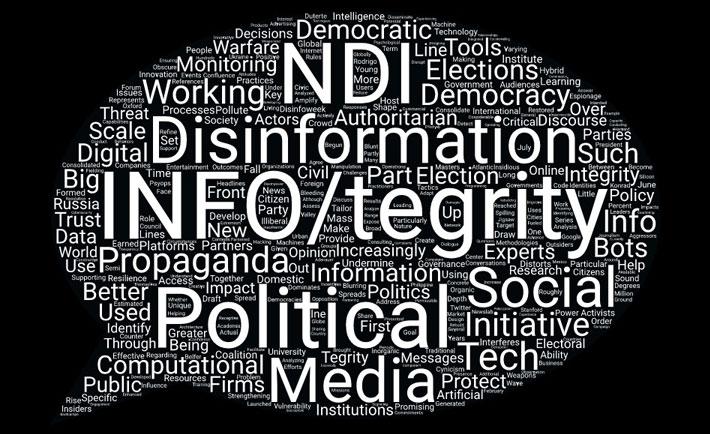As disinformation increasingly threatens the integrity of democratic discourse, NDI continues to expand its responses for detecting, analyzing, and combating it. Protecting political information and discourse from manipulation has long been a core component of NDI’s mission. Long before the issue of Russian disinformation became the subject of headlines in the U.S., NDI has been working with partners to understand and counter efforts to manipulate information, although the terminology used has evolved. Early NDI programs, for example, looked at the issue of “anti-democratic trolling.” In the June 2015 edition of the Journal of Democracy, NDI’s director for elections, Pat Merloe, published an article focused on “election monitoring versus disinformation,” which focused on a variety of tactics that authoritarian regimes have used to create confusion about the credibility of elections, including the use of tactics such as “zombie election monitors”.
NDI has continued to give increased attention to the use of computational propaganda, the hacking of political information, and the use of artificial intelligence to manipulate political discourse. In November 2016, NDI hosted a discussion with the then-Deputy Secretary of State Tony Blinken and thought leaders in Silicon Valley on the impact of artificial intelligence and computational propaganda on democratic development. In 2017, NDI hosted the U.S. premiere of the Oxford Internet Institute’s case studies on computational propaganda worldwide. This event kicked off #DisInfoWeek, an effort by NDI and its partners to shed light on the growing threats of global disinformation. The week included a keynote address by NDI Chairman Madeleine K. Albright at an Atlantic Council event, and a Digital Disinformation Forum (DDF) that was co-hosted by NDI and Stanford University in Palo Alto, California. DDF was a groundbreaking NDI event, which convened more than 110 stakeholders from Silicon Valley, the democracy community, and global media and research organizations. DDF showcased disinformation as a growing pervasive threat to global democratic discourse, especially online. While Russia has captured much of the headlines in the US, these techniques are increasingly being used by authoritarian and populist actors to maintain power at home and project influence abroad.
During DDF, NDI launched INFO/tegrity, an initiative to ensure that efforts to protect political information and democratic discourse from manipulation are applied across all NDI programs. Since its launch and with the support of the National Endowment of Democracy (NED), NDI has continued to expand its in-house capacity and its external partnerships to advance the following key elements of the initiative:
-
Conducting Research on Vulnerability to Disinformation Across Demographic Groups and Regional Contexts. NDI has been piloting a range of innovative opinion research methodologies and approaches to understanding which segments of the population in a country are more resistant to disinformation, and which are more vulnerable -- including understanding how various strategies and types of disinformation impact groups differently. The research is informing approaches to building resistance to disinformation, as well as efforts to counter it. As research is conducted in more country contexts, it will provide a more nuanced understanding of the ways in which vulnerability and resistance to disinformation vary across political contexts. This work is complemented by studies on the connections between online harassment and violence and political engagement, particularly on women and marginalized groups.
-
Monitoring Disinformation and Computational Propaganda in Elections. After writing the Brazil case study on computational propaganda for the Oxford Internet Institute, I was fortunate to begin my career at NDI by serving as a disinformation analyst in a long-term election observation effort for the Georgian local elections. Based on these experiences and the experiences of citizen monitoring organizations around the globe, NDI is developing and sharing guidance on how to integrate monitoring of disinformation and computational propaganda in elections.
-
Strengthening Political Party Commitments to Informational Integrity. Hacking of political parties can often be a component of disinformation campaigns. Working with Harvard University’s Belfer Center, NDI recently conducted a series of consultations with political party partners in a number of at-risk countries, to explore various approaches and techniques for addressing cybersecurity vulnerabilities.
-
Helping Social Media Platforms and Tech Firms “Design for Democracy.” NDI has maintained a presence in Silicon Valley since 2013, focusing on a range of issues from civic tech to open government. NDI has increasingly been asked by partners to help resolve issues relating to social media platforms, in the face of political sabotage or other efforts to misuse social media platforms. NDI is currently working on a more structured mechanism for ongoing communication and dialogue between the democracy community and social media and tech firms, with the goal of helping these firms to “design for democracy.”
-
Sharing Tools to Detect, Analyze and Disrupt Disinformation. In June 2017, NDI co-hosted the Global Electoral Integrity Dialogue in Tbilisi, Georgia, which brought together leading electoral management bodies, citizen observers, and international representatives to discuss experiences and challenges to addressing disinformation in elections. In September of last year, NDI convened a discussion on disinformation in elections at the Human Dimensions Implementation Meeting in Warsaw, Poland, under the auspices of the Organization for Security and Cooperation in Europe. NDI is currently working with the election management body in Mexico (INE) to share international learning on disinformation and effective approaches for countering disinformation; stay tuned for a subsequent blog post on an upcoming event that NDI is co-sponsoring with INE in Mexico City.
Future blog posts will examine each element of NDI’s initiative in greater detail and what NDI is doing to drive innovation across the government, non-profit and business sectors to address the threat of disinformation. While the threats of disinformation are real and growing, NDI remains committed to building out strategies and tools that combat this ubiquitous global threat to democracy. INFO/tegrity is the first step in what will be a dedicated component of the Institute’s programming for years to come.


